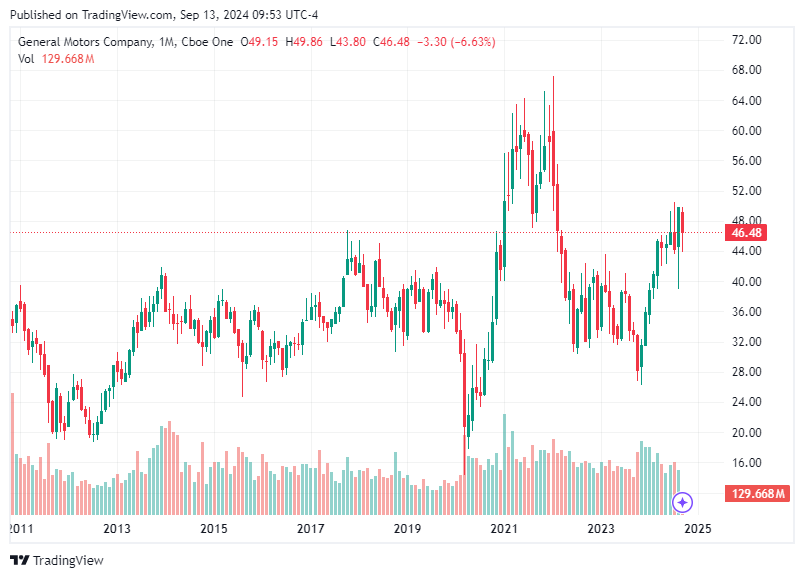General Motors and Hyundai Consider Joint Car Development
Exploring the Potential Partnership Between General Motors and Hyundai.

Disclaimer: The information contained in this article is based on current discussions and agreements between General Motors and Hyundai Motor Company, which may be subject to change as the partnership evolves.
We are working endlessly to provide free insights on the stock market every day, and greatly appreciate those who are paid members supporting the development of the Stock Region mobile application. Stock Region offers daily stock and option signals, watchlists, earnings reports, technical and fundamental analysis reports, virtual meetings, learning opportunities, analyst upgrades and downgrades, catalyst reports, in-person events, and access to our private network of investors for paid members as an addition to being an early investor in Stock Region. We recommend all readers to urgently activate their membership before reaching full member capacity (500) to be eligible for the upcoming revenue distribution program. Memberships now available at https://stockregion.net
One such potential collaboration that has garnered attention is between General Motors (GM) and Hyundai Motor Company. Both automotive giants are in discussions to explore joint car development, with a focus on both electric and hydrogen-powered vehicles.
Introduction to the Potential Partnership
The automotive industry is at a crossroads, driven by the need for sustainable solutions and innovation. The potential partnership between GM and Hyundai is poised to address these demands, leveraging the strengths of each company to foster cost efficiency and technological advancement. By working together, GM and Hyundai aim to enhance their competitive edge, presenting a unified front in the race towards cleaner, more efficient vehicle technologies.
Headquartered in Detroit, Michigan, General Motors is one of the largest automotive manufacturers globally. With a longstanding history, GM has been pivotal in shaping the automotive industry through innovation and market positioning. The company has been at the forefront of electric vehicle (EV) technology, evident in its development of the Chevrolet Bolt EV and its ambitious plans to transition its vehicle lineup to electric models entirely by 2035.
Hyundai, based in Seoul, South Korea, is a dominant force in the automotive world, known for its robust vehicle portfolio and commitment to innovation. Hyundai has made significant strides in the electric vehicle market and is a leader in hydrogen fuel cell technology, exemplified by its NEXO hydrogen vehicle. The company has committed to expanding its EV and hydrogen offerings as part of its vision for a more sustainable future.
Framework Agreement Details
The framework agreement between GM and Hyundai marks the initial step towards a potential strategic partnership. The non-binding Memorandum of Understanding (MoU) outlines multiple core areas for potential collaboration:
Co-Development and Production: The companies are exploring joint efforts in the development and production of both passenger and commercial vehicles, focusing on internal combustion engines and clean energy technologies.
Shared Sourcing Opportunities: GM and Hyundai are considering combining their sourcing efforts in critical areas such as battery raw materials and steel. This approach aims to reduce costs and ensure a steady supply chain for essential components.
Innovation in Clean Energy: The partnership will leverage GM's expertise in electric vehicles and Hyundai’s advancements in hydrogen technology, potentially leading to groundbreaking developments in clean energy vehicles.
Benefits
Cost Reduction: By sharing resources and expertise, GM and Hyundai can achieve economies of scale, reducing production costs and making advanced technologies more accessible.
Accelerated Innovation: The collaboration could spur faster innovation, with both companies pooling their research and development capabilities to create cutting-edge vehicle technologies.
Enhanced Market Competitiveness: Together, GM and Hyundai can strengthen their market positions, offering a wider range of vehicles with improved features and eco-friendly technologies.
Challenges
Integration of Operations: Merging the operational processes of two large companies can be complex, requiring careful coordination to ensure seamless collaboration.
Cultural and Differences: Navigating the cultural and differences between an American and a South Korean company may pose challenges, necessitating clear communication and shared goals.
Regulatory Hurdles: The partnership will need to comply with varying regulations across different markets, which could complicate joint projects and product launches.
The potential partnership between GM and Hyundai could have far-reaching implications for the automotive market. By focusing on electric and hydrogen technologies, the collaboration may accelerate the industry's shift towards sustainable transportation solutions. Consumers could benefit from a broader selection of advanced vehicles, integrating cutting-edge technologies at competitive prices. The partnership could drive other automakers to pursue similar alliances, fostering a more collaborative approach to innovation in the industry. Such developments may lead to rapid advancements in vehicle technology, reshaping the automotive landscape and aligning it with global sustainability goals.
The potential partnership between General Motors and Hyundai represents a significant step towards a more sustainable and innovative automotive industry. By combining their strengths, both companies have the opportunity to reduce costs, enhance their competitive positions, and deliver superior products to consumers. While challenges remain, the collaboration holds promise for driving substantial advancements in vehicle technology, setting a new standard for the industry.
Disclaimer: The information contained in this article is based on current discussions and agreements between General Motors and Hyundai Motor Company, which may be subject to change as the partnership evolves.


